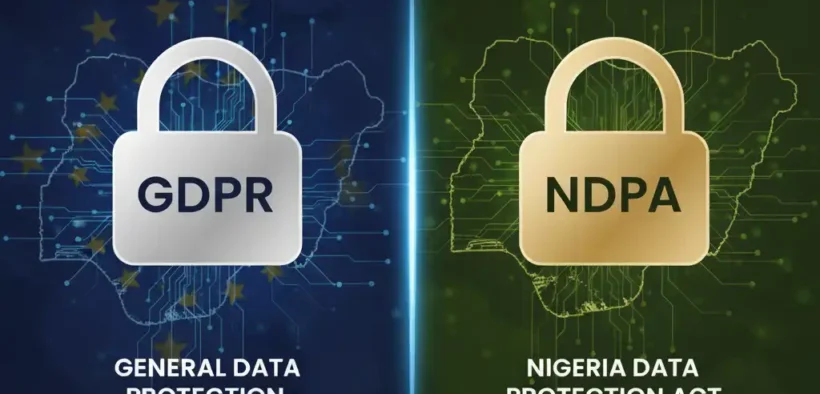GDPR vs NDPA: Key Differences Explained
Share

Why Compare GDPR and NDPA?
The General Data Protection Regulation (GDPR) and the Nigeria Data Protection Act (NDPA) are two major privacy laws shaping how organizations handle personal data.
-
GDPR: EU-wide law, effective since May 2018.
-
NDPA: Nigeria’s first full-fledged data protection law, signed in 2023.
Both laws protect individuals’ privacy and regulate companies, but there are unique differences every compliance officer, startup founder, and lawyer should know.
At a Glance: GDPR vs NDPA
| Feature | GDPR (EU) | NDPA (Nigeria) |
|---|---|---|
| Jurisdiction | Applies across EU + foreign companies processing EU residents’ data | Applies across Nigeria + foreign companies processing Nigerian data |
| Enforcement Authority | Independent Data Protection Authorities (per EU member state) + European Data Protection Board (EDPB) | Nigeria Data Protection Commission (NDPC) |
| Legal Instrument | Regulation (directly binding law) | National Act (parliamentary law) |
| Fines | Up to €20M or 4% of global annual turnover | NDPC may impose fines (amounts guided by regulations & NDPR precedent) |
| Controllers of Major Importance | Not a GDPR category | Unique to NDPA — entities handling large-scale or sensitive data |
| Data Subject Rights | Access, rectification, erasure, portability, restriction, objection, automated decision-making | Similar rights, but emphasis on Nigerian context (e.g. local complaint mechanisms) |
| Lawful Bases for Processing | Consent, contract, legal obligation, vital interest, public task, legitimate interest | Consent, contract, legal obligation, vital interest, public interest |
| Data Protection Officer (DPO) | Mandatory for certain organizations | Required for Controllers/Processors of Major Importance |
| Cross-Border Transfers | Restricted unless adequate safeguards exist | Permitted but must align with NDPC guidance |
| Accountability Principle | Central to GDPR | Explicitly embedded in NDPA (prove compliance) |
| Impact Assessments (DPIA) | Required for high-risk processing | Also required, with NDPC oversight |
Key Differences Explained
1. Enforcement Models
-
GDPR: Decentralized — each EU country has its Data Protection Authority, coordinated by the EDPB.
-
NDPA: Centralized — the Nigeria Data Protection Commission (NDPC) regulates, investigates, and enforces.
2. Controllers of Major Importance
-
GDPR doesn’t define this category.
-
NDPA introduces it for organizations that process sensitive data at scale or pose national risks. This is a uniquely Nigerian compliance burden.
3. Fines & Sanctions
-
GDPR penalties are fixed and well-defined.
-
NDPA penalties are guided by regulations and will evolve as NDPC issues frameworks.
4. Cross-Border Data Flow
-
GDPR allows transfers only to “adequate” countries or with safeguards.
-
NDPA is still developing adequacy frameworks but requires compliance with NDPC-approved safeguards.
5. Cultural & Market Context
-
GDPR reflects EU concerns about consumer privacy and strong regulatory tradition.
-
NDPA is tailored to Nigeria’s digital economy, local realities (e.g. SIM registration, fintech boom), and capacity challenges.
Similarities You Should Note
-
Both laws give individuals control over their personal data.
-
Both require accountability, consent management, and DPIAs.
-
Both apply extraterritorially (foreign companies must comply).
-
Both stress protection of sensitive personal data (health, biometrics, political, religious data).
Real-World Examples
Example 1: Nigerian Fintech Expanding to Europe
-
Must comply with both NDPA and GDPR if processing Nigerian and EU residents’ data.
Example 2: EU SaaS Provider Serving Nigeria
-
Subject to GDPR by default.
-
Also covered by NDPA since it processes Nigerian clients’ data.
Example 3: Local Nigerian Hospital
-
Covered by NDPA only.
-
Must adopt stricter safeguards for medical records under NDPA.
Practical Takeaways
-
If you’re in Nigeria: Focus on NDPA compliance first, but align with GDPR if you serve international users.
-
If you’re EU-based: Assume NDPA applies if you collect Nigerian data.
-
If you’re global: Aim for GDPR-level compliance — it covers NDPA basics and more.
FAQ: GDPR vs NDPA
Q1: Is NDPA a copy of GDPR?
Not exactly. NDPA borrows concepts but introduces unique categories like Controllers of Major Importance.
Q2: Which is stricter — GDPR or NDPA?
GDPR is generally stricter, but NDPA is catching up fast.
Q3: Does NDPA recognize “legitimate interest” like GDPR?
No. NDPA uses “public interest” instead, limiting flexibility.
Q4: Can one DPO serve for GDPR and NDPA compliance?
Yes, but ensure they’re familiar with both frameworks.
Q5: Does NDPA apply to anonymised data?
No. Just like GDPR, anonymised data is out of scope, but pseudonymised data is covered.





































Leave a Reply